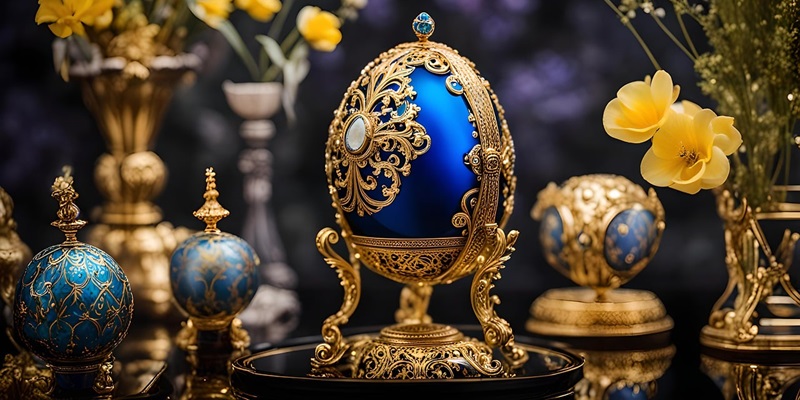Renowned luxury jeweler Fabergé has been commissioned by Konvi, Europe’s premier luxury assets fractional investment platform, to create its first-ever Christmas Egg Objet. This remarkable endeavor marks a milestone in the world of luxury asset investment, offering individuals the opportunity to own a piece of history and splendor that was once exclusively available to the wealthiest elite. The custom-made ‘Christmas Egg,’ a nod to Fabergé’s storied past, is now available for fractional investment on the Konvi platform, with the minimum investment starting at €250.
The Historical Allure of Fabergé Eggs
Historically, Fabergé eggs were crafted for the Russian imperial family in the late 19th century, using only the finest precious metals and gemstones. These magnificent creations, with their intricate designs and exquisite craftsmanship, have become synonymous with luxury and exclusivity. Fabergé’s reputation for unparalleled quality ensures that each piece remains a valuable asset. The limited production of approximately 2,300 pieces annually further enhances their rarity and investment potential. These masterpieces have shown an appreciation rate of 28% annually based on valuations and sales from 2000 to 2014, with some fetching over $1 million at auctions.
Fabergé’s latest creation, the Christmas-themed egg, continues this legacy of opulence. By partnering with Konvi, Fabergé is extending the reach of its renowned craftsmanship to a broader audience. Fractional ownership allows more people to partake in owning a piece of history, democratizing access to these luxury items. This collaboration signifies a merger of historic artistry with modern financial innovation, creating a unique investment opportunity that resonates with both traditional collectors and contemporary investors.
The Democratization of Luxury Investments
Konvi, known for its innovative approach to luxury asset investments, enables retail investors to buy fractional shares of high-value items that would otherwise be beyond their financial reach. By introducing the Fabergé Christmas Egg as an investment opportunity, Konvi is fulfilling its mission to democratize luxury asset investing. This approach allows more people to benefit from the high returns traditionally reserved for wealthy individuals. Investors can appreciate the value of their shares over time, culminating in a profit return when the asset is sold at auction through Konvi’s partner, Henry’s Auktionhaus.
Eran Peer, Co-Founder and CEO of Konvi, emphasized that this initiative is part of Konvi’s broader goal: to make luxury asset investing accessible to a wider audience. By allowing fractional investments, Konvi disrupts the traditional model that restricted access to luxury assets to only a select few. This model ensures that high-value items are no longer the sole domain of the affluent, fostering a more inclusive investment landscape. The collaboration with Fabergé exemplifies how Konvi bridges the gap between exclusive luxury and general accessibility, offering retail investors a chance to own a part of an exquisite heritage.
Expanding Investment Opportunities
Luxury assets have become increasingly popular due to their promising financial returns. These assets, including art, fine wines, whiskeys, watches, and vintage cars, provide a hedge against traditional market volatility. They tend to have returns that are negatively correlated with equities, bonds, and other collectibles, making them excellent for portfolio diversification. Historically, investments in luxury assets required high upfront costs, limited availability, and were primarily limited to wealthy and sophisticated investors due to private market structures with high fees and barriers to entry.
Konvi’s platform disrupts traditional luxury asset investment models by offering a Pan-European platform for fractional investments in carefully curated luxury items. By working with industry experts known for their robust track records, Konvi ensures that each investment opportunity is meticulously chosen, providing retail investors with high-quality, well-researched options. This innovation opens up the luxury market, traditionally dominated by high-net-worth individuals and collectors, to a broader audience. Fractional ownership democratizes the investment landscape, providing an inclusive approach to wealth growth and portfolio diversification.
A New Paradigm in Luxury Investing
Prestigious luxury jeweler Fabergé has been commissioned by Konvi, Europe’s leading luxury assets fractional investment platform, to design its inaugural Christmas Egg Objet. This groundbreaking project signals a significant moment in the luxury asset investment world, enabling people to own a piece of history and opulence previously reserved for the ultra-wealthy. Modeled after Fabergé’s illustrious legacy, the bespoke ‘Christmas Egg’ is now available for fractional ownership through the Konvi platform, with the minimum investment set at €250.
This egg isn’t just an investment; it’s a chance to hold part of a brand synonymous with extraordinary craftsmanship and grandeur. Each piece reflects Fabergé’s dedication to intricate detail and timeless elegance. Investors can now own a fragment of this unparalleled artistry, spreading the allure of Fabergé beyond traditional wealthy circles. By lowering the entry barrier, Konvi makes these coveted assets accessible, inviting a new class of investors into the realm of high-end luxury collectibles.

